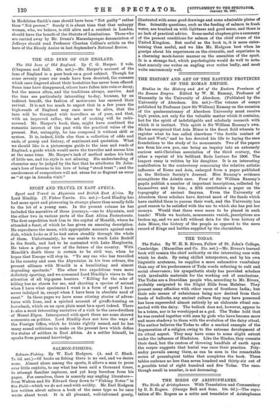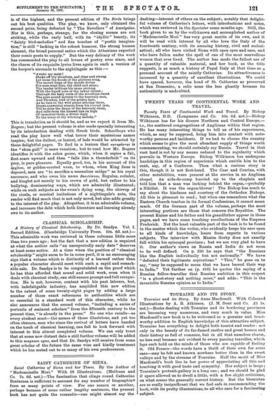is of the highest, and the present edition of The
Birds brings out his best qualities. The play, we know, only obtained the second prize, being defeated by 'The Revellers" of Ameipsias. Nor is this, perhaps, strange, for the closing scenes are not striking, while the early half, • with its "idyllic" beauty, its "dainty bird-melodies" and fine touches of "poetic imagina- tion," is still" lacking in the robust humour, the strong human element, the broad personal satire which the Athenians expected their comic poets to supply." But the very delicacy of the work has commended the play to all lovers of poetry. ever since, and the Charm of its exquisite lyrics lives again in such a version of the hoopoe's serenade to the nightingale as this :— "Awake my mate! Shake off thy slumbers, and clear and strong Let loose the floods of thy glorious song, The sacred dirge of thy mouth divine For sore-wept Itymethy child and mine; Thy tender Millings his name prolong With the liquid note of thy tawny throat ; Through the leafy curls of the wOodbine sweet The pure mund mmusta to the heavenly sent, And Phoebus, lord of the golden hair, As he lists to thy wild plaint echoing there, Draws answering strains from his ivoried lyre, Till he stirs the dance of the heavenly choir, And calla from the blessed lips on high Of immortal Gods, a divine reply
To the tones of thy witching melody.. •
This is translation as it should be, and as we expect it from Mr. Rogers; but the present volume is also made specially interesting by its introduction dealing with Greek birds. Schoolboys who read the play know well what terror their mysterious names inspire; but the dullest, or laziest, of lads would be attracted by these delightful pages. To find in a lexicon that karapcheres is the "skua gull" is mere vexation ; but to read how Mr. Rogers identifies it with the solan goose, which, when it espies a fish, first soars upward and then "falls like a thunderbolt" on its prey, is pure pleasure. Equally good, too, is his account of the intims, or golden-crested wren, to whom, when King Zeus is deposed, men are "to sacrifice a masculine midge" as his royal successor, and who owes his name Baoarcncos, Regulus, roitelet, and kinglet not merely to his crown of gold, but rather to his bullying, domineering, ways, which are admirably illustrated ; while on such subjects as the swan's dying song, the chirrup of the cicala, or musical imitations of a nightingale's note, the reader will find much that is not only novel, but also adds greatly to the interest of the play. Altogether, it is an admirable volume, and increases the debt which both literature and learning already owe to its author.























































 Previous page
Previous page